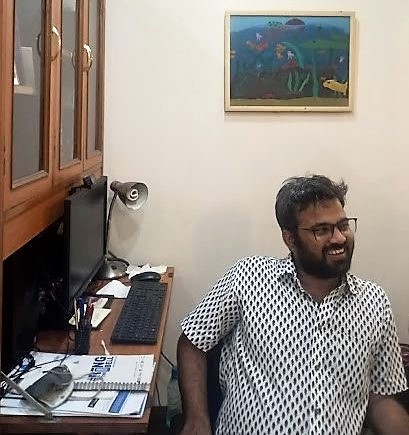Meet our New Faculty | Dr. Chandrabhan Yadav
April 13, 2023
We are very happy to welcome Dr. Chandrabhan P. Yadav as he joins us as Assistant Professor, Social Sciences. Dr. Yadav is a historian with a deep interest in various social processes. His broader research interests include Caste studies, Buddhist studies, and Ambedkar’s thought. He completed his M.Phil. and Ph.D. from the Centre for Historical Studies, Jawaharlal Nehru University and has taught History courses at Indraprastha College for Women, Delhi University for over five years.
In this interview, he tells us more about his interests and his work.
 1. Can you tell us more about yourself/your background?
1. Can you tell us more about yourself/your background?
I was born in a remote district named Ballia (eastern UP) and that is where my early childhood was spent. I lived in Allahabad for some part of my schooling and then moved to Delhi for my College education. I graduated with a B.A. honors in History and a B.Ed. from Jamia Millia Islamia. At JNU, I did my MA in Ancient History and wrote my M.Phil dissertation on the relationship between identities and ethics (Buddhist primarily). I also earned my doctorate from JNU for my work on the Pali Jatakas. My doctoral thesis explores the social philosophy of Buddhism through an in-depth study of the Buddhist text Jātakatthavaṇṇanā (popularly known as Jataka).
Apart from my interests in History, I have been a theatre artist for some years and worked with a Delhi-based amateur theater group named Bahroop. I write poetry and also would like to write stories for children. I am currently working on a translation of a Pali text Therigatha into Hindi and Bhojpuri.
2. What are your main areas of interest and teaching? How did your interest in these areas begin?
My main areas of interest are early Indian history, social history, Buddhism and Ambedkar’s thought. My interest in caste studies and social history comes through my own social background and the academic as well as political environment in the Jawaharlal Nehru University. I also owe this in large measures to Dalit autobiographies in different languages. I was already fascinated with Buddhism, and via Buddhism is how I got interested in Ambedkar’s thought. My teachers and scholars at the Center for Historical Studies, JNU, further helped me think seriously to pursue the discipline of History, and I decided to do my research on the social history of early India.
3. What will you be teaching at NLS?
I will be teaching History as a core course in the upcoming trimesters to the B.A. LLB students.
As a discipline of knowledge, History not only tells us how our many presents (socio-economic, cultural, political etc.) are shaped through historical processes but it also reminds us about enormous changes that happened in the past. All our identities, our belief systems, our political structures have kept changing and never been static. And this can give us a different perspective when we reflect upon any social or legal question.
4. Your thoughts on starting your teaching journey at NLS? What are your plans ahead?
Previously, I was at Delhi University (Indraprastha College for Women) for around five years where I primarily taught undergraduate History students. It may be a challenging task to engage with Law students. But I am excited to learn new things. Apart from core courses, I am also interested in offering electives on the rich repertoire of early Indian literature and see if connections can be made with contemporary social and legal aspects. For instance a course on the Mahabharata, or the Ramayana or on the Manusmriti or on the Jatakas. I am also thinking about a theme of Buddhism and Law which I can develop later as a course.
5. Could you highlight some of your key projects or publications?
I have published several articles exploring the relationship between marginal groups and Buddhism in an early historic social context. In the article ‘Examining kamma/karma doctrine in the Buddhist Jātakas’ published in the Proceedings of the Indian History Congress (Vol.80), I have argued that in the Buddhist birth stories we do not find kamma/karma doctrine used to justify birth based hierarchies.
I have published two articles on the depiction of Untouchables (Chandalas) in the Pali Jatakas and recently, I have also published an article in an edited volume on forest dwellers; and Buddhist attitude towards them. My articles on untouchables (Chandalas) contest historians who have argued for a similar treatment in the Buddhist system towards untouchability.
I was recently awarded the Navayana Dalit History Fellowship, and am working on a monograph titled, ‘Following the Trail: Ambedkar, Buddhism and Caste’ towards the end of this Fellowship.
To reach out to Dr. Chandrabhan, please write to

